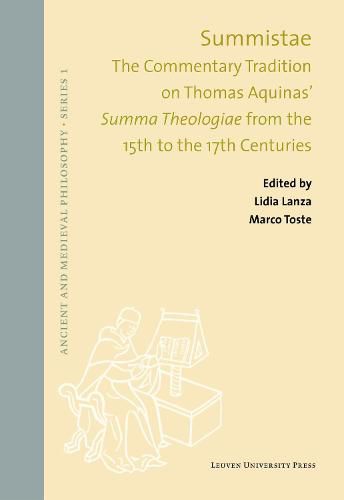Readings Newsletter
Become a Readings Member to make your shopping experience even easier.
Sign in or sign up for free!
You’re not far away from qualifying for FREE standard shipping within Australia
You’ve qualified for FREE standard shipping within Australia
The cart is loading…






This title is printed to order. This book may have been self-published. If so, we cannot guarantee the quality of the content. In the main most books will have gone through the editing process however some may not. We therefore suggest that you be aware of this before ordering this book. If in doubt check either the author or publisher’s details as we are unable to accept any returns unless they are faulty. Please contact us if you have any questions.
Thomas Aquinas’ Summa theologiae is one of the classics in the history of theology and philosophy. Beyond its influence in the Middle Ages, its importance is also borne out by the fact that it became the subject of commentary. During the sixteenth century it was gradually adopted as the official text for the teaching of scholastic theology in most European Catholic universities. As a result, university professors throughout Europe and the colonial Americas started lecturing and producing commentaries on the Summa and using it as a starting point for many theological and philosophical discussions. Some of the works of major authors such as Vitoria, Soto, Molina, Suarez and Arriaga are nothing more than commentaries on the Summa. This book is the first scholarly endeavour to investigate this commentary tradition. As it examines late scholasticism against its institutional backdrop and contains studies of manuscripts and texts unpublished, it will remain an authoritative source for the research of late scholasticism.
Contributors: Igor Agostini (University of Salento), Monica Brinzei (CNRS-IRHT, Paris), William Duba (University of Fribourg), Matthew Gaetano (Hillsdale College), Helen Hattab (University of Houston), Lidia Lanza (University of Lisbon), Mauro Mantovani (Salesian Pontifical University), Daniel D. Novotny and Tomas Machula (University of South Bohemia in Ceske Budejovice), Chris Schabel (University of Cyprus), Jean-Luc Solere (Boston College), Marco Toste (University of Fribourg), Andreas Wagner (Goethe University of Frankfurt), Ueli Zahnd (University of Geneva)
$9.00 standard shipping within Australia
FREE standard shipping within Australia for orders over $100.00
Express & International shipping calculated at checkout
This title is printed to order. This book may have been self-published. If so, we cannot guarantee the quality of the content. In the main most books will have gone through the editing process however some may not. We therefore suggest that you be aware of this before ordering this book. If in doubt check either the author or publisher’s details as we are unable to accept any returns unless they are faulty. Please contact us if you have any questions.
Thomas Aquinas’ Summa theologiae is one of the classics in the history of theology and philosophy. Beyond its influence in the Middle Ages, its importance is also borne out by the fact that it became the subject of commentary. During the sixteenth century it was gradually adopted as the official text for the teaching of scholastic theology in most European Catholic universities. As a result, university professors throughout Europe and the colonial Americas started lecturing and producing commentaries on the Summa and using it as a starting point for many theological and philosophical discussions. Some of the works of major authors such as Vitoria, Soto, Molina, Suarez and Arriaga are nothing more than commentaries on the Summa. This book is the first scholarly endeavour to investigate this commentary tradition. As it examines late scholasticism against its institutional backdrop and contains studies of manuscripts and texts unpublished, it will remain an authoritative source for the research of late scholasticism.
Contributors: Igor Agostini (University of Salento), Monica Brinzei (CNRS-IRHT, Paris), William Duba (University of Fribourg), Matthew Gaetano (Hillsdale College), Helen Hattab (University of Houston), Lidia Lanza (University of Lisbon), Mauro Mantovani (Salesian Pontifical University), Daniel D. Novotny and Tomas Machula (University of South Bohemia in Ceske Budejovice), Chris Schabel (University of Cyprus), Jean-Luc Solere (Boston College), Marco Toste (University of Fribourg), Andreas Wagner (Goethe University of Frankfurt), Ueli Zahnd (University of Geneva)